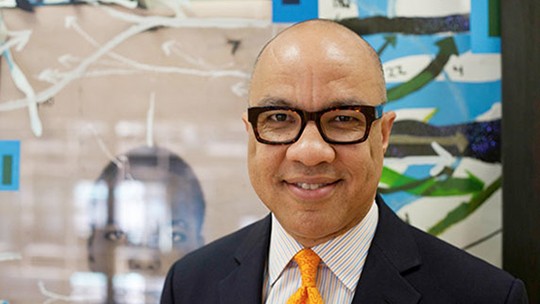San Francisco — Foundation executives need more information in digital technology, its use, access and ‘net neutrality before they can make funding decisions. During an interactive session regarding Internet access, 46 percent of those attending the morning plenary session of the Council on Foundations’ annual meeting said they were interested but needed more information. By the end of the session, the number was up three points but there was much conversation.
In a session called “Sparking a Digital Revolution for Good: The Role of Philanthropy,” Cyrus Farivar, senior editor of Ars Technica, quizzed Darren Walker, president and CEO of the Ford Foundation, and Mitchell Baker, executive chairwoman of the Mozilla Foundation, on the role of foundations and technology. Ford Foundation, the Knight Foundation, the MacArthur Foundation, Mozilla Foundation, and Open Society Foundations have been funding an initiative called #netgain.
“There is no more important platform for a just society for this century,” said Walker of the Internet and access. He ties three elements together: access, fairness and justice. Baker said the technology should be treated as a “public asset.” Walker said the grantmaking sector was “caught flat-footed” and that leaders have been digitally naïve. Baker warned that the Internet has the negative potential of going the route of cable television, where large companies can block access. Walker said the Internet can’t be “tolled.”
Walker said it’s a talent dearth for the charitable sector, both grantors and grantees. Ford Foundation has created a fellows grant program to begin getting tech-trained people into the sector. “There wasn’t public interest law in the 1960s,” he said, adding that the foundation gave grants to law students who launched legal services organizations for low-income people and was the launching pad for the Legal Services Corporation.
“Many young people are adept at consuming technology,” Baker said, but less adept at understanding it and controlling it. It’s about digital literacy and digital citizenship, she said. Questions need to be asked and answered, such as what does digital freedom look like? It can’t be built and then retrofitted. “You can’t build freedom on top if it,” said Baker.
Baker and Walker equated the ‘Click here to accept terms and conditions’ that websites require are the moral equivalent to unconscionable contracts, which were prevalent low-income communities. They are contracts so one-sided that it is unfair to one party and therefore unenforceable under law.
Both called on grantmakers to get involved in technology in their own organizations and working with grantees to evolve the digital revolution.
